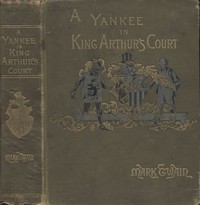A Connecticut Yankee in King Arthur's Court by Mark Twain (the red fox clan .TXT) 📕

Read free book «A Connecticut Yankee in King Arthur's Court by Mark Twain (the red fox clan .TXT) 📕» - read online or download for free at americanlibrarybooks.com
- Author: Mark Twain
Read book online «A Connecticut Yankee in King Arthur's Court by Mark Twain (the red fox clan .TXT) 📕». Author - Mark Twain
And here were these freemen assembled in the early morning to work on their lord the bishop’s road three days each—gratis; every head of a family, and every son of a family, three days each, gratis, and a day or so added for their servants. Why, it was like reading about France and the French, before the ever memorable and blessed Revolution, which swept a thousand years of such villany away in one swift tidal-wave of blood—one: a settlement of that hoary debt in the proportion of half a drop of blood for each hogshead of it that had been pressed by slow tortures out of that people in the weary stretch of ten centuries of wrong and shame and misery the like of which was not to be mated but in hell. There were two “Reigns of Terror,” if we would but remember it and consider it; the one wrought murder in hot passion, the other in heartless cold blood; the one lasted mere months, the other had lasted a thousand years; the one inflicted death upon ten thousand persons, the other upon a hundred millions; but our shudders are all for the “horrors” of the minor Terror, the momentary Terror, so to speak; whereas, what is the horror of swift death by the axe, compared with lifelong death from hunger, cold, insult, cruelty, and heart-break? What is swift death by lightning compared with death by slow fire at the stake? A city cemetery could contain the coffins filled by that brief Terror which we have all been so diligently taught to shiver at and mourn over; but all France could hardly contain the coffins filled by that older and real Terror—that unspeakably bitter and awful Terror which none of us has been taught to see in its vastness or pity as it deserves.
These poor ostensible freemen who were sharing their breakfast and their talk with me, were as full of humble reverence for their king and Church and nobility as their worst enemy could desire. There was something pitifully ludicrous about it. I asked them if they supposed a nation of people ever existed, who, with a free vote in every man’s hand, would elect that a single family and its descendants should reign over it forever, whether gifted or boobies, to the exclusion of all other families—including the voter’s; and would also elect that a certain hundred families should be raised to dizzy summits of rank, and clothed on with offensive transmissible glories and privileges to the exclusion of the rest of the nation’s families—including his own .
They all looked unhit, and said they didn’t know; that they had never thought about it before, and it hadn’t ever occurred to them that a nation could be so situated that every man could have a say in the government. I said I had seen one—and that it would last until it had an Established Church. Again they were all unhit—at first. But presently one man looked up and asked me to state that proposition again; and state it slowly, so it could soak into his understanding. I did it; and after a little he had the idea, and he brought his fist down and said he didn’t believe a nation where every man had a vote would voluntarily get down in the mud and dirt in any such way; and that to steal from a nation its will and preference must be a crime and the first of all crimes. I said to myself:
“This one’s a man. If I were backed by enough of his sort, I would make a strike for the welfare of this country, and try to prove myself its loyalest citizen by making a wholesome change in its system of government.”
You see my kind of loyalty was loyalty to one’s country, not to its institutions or its office-holders. The country is the real thing, the substantial thing, the eternal thing; it is the thing to watch over, and care for, and be loyal to; institutions are extraneous, they are its mere clothing, and clothing can wear out, become ragged, cease to be comfortable, cease to protect the body from winter, disease, and death. To be loyal to rags, to shout for rags, to worship rags, to die for rags—that is a loyalty of unreason, it is pure animal; it belongs to monarchy, was invented by monarchy; let monarchy keep it. I was from Connecticut, whose Constitution declares “that all political power is inherent in the people, and all free governments are founded on their authority and instituted for their benefit; and that they have at all times an undeniable and indefeasible right to alter their form of government in such a manner as they may think expedient.”
Under that gospel, the citizen who thinks he sees that the commonwealth’s political clothes are worn out, and yet holds his peace and does not agitate for a new suit, is disloyal; he is a traitor. That he may be the only one who thinks he sees this decay, does not excuse him; it is his duty to agitate anyway, and it is the duty of the others to vote him down if they do not see the matter as he does.
And now here I was, in a country where a right to say how the country should be governed was restricted to six persons in each thousand of its population. For the nine hundred and ninety-four to express dissatisfaction with the regnant system and propose to change it, would have made the whole six shudder as one man, it would have been so disloyal, so dishonorable, such putrid black treason. So to speak, I was become a stockholder in a corporation where nine hundred and ninety-four of the members furnished all the money and did all the





Comments (0)